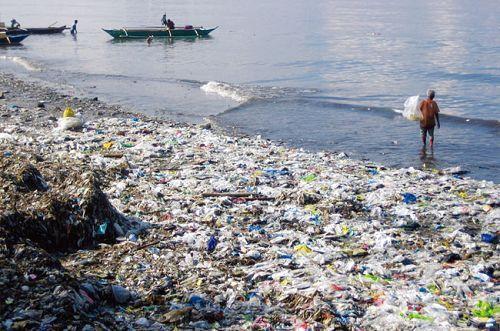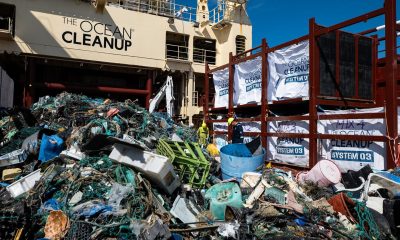Marine Life & Conservation
Plastic waste causes $13 billion in damage to marine ecosystems every year, says UN agency

Concern is growing over widespread plastic waste that is threatening marine life – with conservative yearly estimates of $13 billion in financial damage to marine ecosystems, according to two reports issued at the inaugural meeting of the United Nations Environment Assembly.
“Plastic contamination threatens marine life, tourism, fisheries and businesses,” underscores the eleventh edition of the UN Environment Programme (UNEP) Year Book, which updates 10 issues previously highlighted over the past decade and provides mitigation steps for each.
“Plastics undoubtedly play a crucial role in modern life, but the environmental impacts of the way we use them cannot be ignored,” added Achim Steiner, UNEP Executive Director.
Valuing Plastic, a UNEP-supported report produced by the Plastic Disclosure Project (PDP) and Trucost, makes the business case for managing and disclosing plastic use in the consumer goods industry.
“Over 30 per cent of the natural capital costs are due to greenhouse gas emissions from raw material extraction and processing,” says the report, adding “marine pollution is the largest downstream cost, with the $13 billion figure most likely a significant underestimate.”
Calculating the negative financial impact of issues, such as marine environment or air pollution caused by incinerating plastic, the report reveals that the overall natural capital cost in the consumer goods sector each year is $75 billion.
A large and unquantifiable amount of plastic waste enters the ocean from littering, poorly managed landfills, tourist activities and fisheries. Some of this material sinks to the ocean floor, while some floats and can travel over great distances on ocean currents – polluting shorelines and accumulating in massive mid-ocean gyres.
“These reports show that reducing, recycling and redesigning products that use plastics can bring multiple green economy benefits: from reducing economic damage to marine ecosystems and the tourism and fisheries industries – vital for many developing countries – to bringing savings and opportunities for innovation to companies while reducing reputational risks,” advocated Mr. Steiner.
There have been many reliable reports of environmental damage due to plastic waste that include mortality or illness when ingested by sea creatures such as turtles; entanglement of animals, such as dolphins and whales; and damage to critical habitats, such as coral reefs.
There are also concerns about chemical contamination, invasive species spread by plastic fragments and economic damage to the fishing and tourism industries in many countries by, for example, fouling fishing equipment and polluting beaches.
Since the 2011 UNEP Year Book last reviewed plastic waste in the ocean, concern has grown over microplastics (particles up to 5 mm in diameter, either manufactured or created when plastic fragments), which have been ingested by marine organisms – including seabirds, fish, mussels, worms and zooplankton.
“One emerging issue is the increasing use of microplastics directly in consumer products, such as ‘microbeads’ in toothpaste, gels and facial cleansers,” explains the UNEP Year Book. “These microplastics tend not to be filtered out during sewage treatment, but are released directly into rivers, lakes and the ocean.”
Communities of microbes have been discovered thriving on microplastics at multiple locations in the North Atlantic – where the “plastisphere” can facilitate the transport of harmful microbes, pathogens and algal species.
The Yearbook affirms that “microplastics have also been identified as a threat to larger organisms, such as the endangered northern right whale, which is potentially exposed to ingestion through filter-feeding.”
Production trends, use patterns and changing demographics are expected to cause increasing plastic use, and both reports call for companies, institutions and consumers to reduce their waste.
Valuing Plastic finds that while consumer goods companies currently save $4 billion each year through good plastic management, such as recycling, plastic use disclosure is poor. Less than half of the 100 companies assessed reported any data relevant to plastic.
“The research unveils the need for companies to consider their plastic footprint, just as they do for carbon, water and forestry,” said Andrew Russell, Director of the PDP. “By measuring, managing and reporting plastic use and disposal through the PDP, companies can mitigate the risks, maximize the opportunities, and become more successful and sustainable.”
Initiatives such as the PDP and UNEP-led Global Partnership on Marine Litter have helped raise awareness of, and begun to address, the issue. However, much more needs to be done.
Recommendations of the reports include that companies monitor their plastic use and publish the results in annual reports; and commit to reducing the environmental impact of plastic through clear targets, deadlines and efficiency and recycling innovations.
Since plastic particles can be ingested by marine organisms and potentially accumulate and deliver toxins through the food web, efforts should be stepped up to fill the knowledge gaps and better understand the capacity of various plastics to absorb and transfer persistent, toxic and bioaccumulating chemicals.
“By putting a financial value on impacts – such as plastic waste – companies can further integrate effective environmental management into mainstream businesses,” asserted Trucost Chief Executive Richard Mattison. “By highlighting the savings from reuse and recycling, it builds a business case for proactive sustainability improvements.”
Source: www.islandsbusiness.com
Blogs
The Ocean Cleanup Breaks 10,000,000 KG Barrier

The Ocean Cleanup, the global non-profit project, has removed a verified all-time total of ten million kilograms (22 million lbs.) of trash from oceans and rivers around the world – approximately the same weight as the Eiffel Tower.
To complete its mission of ridding the oceans of plastic, The Ocean Cleanup uses a dual strategy: cleaning up the Great Pacific Garbage Patch (GPGP) to remove the plastic already afloat in the oceans, while stopping the flow of plastic from the world’s most polluting rivers.
Through cleaning operations in the GPGP and in rivers in eight countries, the cumulative total of trash removed has now surpassed ten million kilograms. This milestone demonstrates the acceleration of The Ocean Cleanup’s impact, while underlining the astonishing scale of the plastic pollution problem and the need for continued support and action.
While encouraging for the mission, this milestone is only a staging point: millions more tons of plastic still pollute our oceans and The Ocean Cleanup intends to continue learning, improving and innovating to solve this global catastrophe.
This announcement comes as governments from around the world meet to continue negotiations to develop a new legally binding instrument to end plastic pollution at INC4 in Ottawa, Canada. Representatives of The Ocean Cleanup will be in attendance and the organization will be urging decision-makers to collaborate towards a comprehensive and ambitious global treaty which addresses plastic at all stages of its life cycle and in all marine environments worldwide, including in areas beyond national jurisdiction.
It is encouraging to see that the need for remediation is reflected in the various options for potential treaty provisions. It is essential that the final treaty contains clear targets for the remediation of legacy plastic pollution, and reduction of riverine plastic emissions.
Tackling plastic pollution requires innovative and impactful solutions. The treaty should therefore incentivize the innovation ecosystem by fostering innovations that make maximal use of data, technology and scientific knowledge – such as those designed and deployed by The Ocean Cleanup.
‘After many tough years of trial and error, it’s amazing to see our work is starting to pay off – and I am proud of the team who has brought us to this point.’ said Boyan Slat, Founder and CEO of The Ocean Cleanup. ‘While we still have a long way to go, our recent successes fill us with renewed confidence that the oceans can be cleaned.’
The Ocean Cleanup was founded in 2013 and captured its first plastic in 2019, with the first confirmed catch in the GPGP coming soon after the deployment of Interceptor 001 in Jakarta, Indonesia. After surpassing one million kilograms of trash removed in early 2022, the non-profit project has since progressed to the third iteration of its GPGP cleaning solution, known as System 03, and a network of Interceptors currently covering rivers in eight countries, with more deployments set for 2024.
About The Ocean Cleanup
The Ocean Cleanup is an international non-profit organization that develops and scales technologies to rid the world’s oceans of plastic. They aim to achieve this goal through a dual strategy: stemming the inflow via rivers and cleaning up the legacy plastic that has already accumulated in the ocean. For the latter, The Ocean Cleanup develops large-scale systems to efficiently concentrate the plastic for periodic removal. This plastic is tracked and traced through DNV’s chain of custody model to certify claims of origin when recycling it into new products. To curb the tide via rivers, The Ocean Cleanup has developed Interceptor™ solutions to halt and extract riverine plastic before it reaches the ocean. Founded in 2013 by Boyan Slat, The Ocean Cleanup now employs a broadly multi-disciplined team of approximately 140. The foundation is headquartered in Rotterdam, the Netherlands.
For more information, visit: theoceancleanup.com and follow @theoceancleanup on social media.
Marine Life & Conservation
Steve Backshall to headline Shark Trust’s flagship event: For the Love of Sharks

Join a host of amazing, shark loving, speakers including Steve Backshall and the Shark Trust team for an evening celebrating shark conservation at the Royal Geographical Society in London this November.
Date: 29th November 2024
Time: 6-10pm
Location: Royal Geographical Society, London
Tickets: https://www.sharktrust.org/Event/flos24
The event will be a celebration of all things shark. Those lucky enough to get hold of tickets will hear from engaging guest speakers with a passion for sharks.
The line-up includes (*subject to change if unforeseen circumstances arise)
Steve Backshall: One of television’s busiest presenters, BAFTA award-winning wildlife expert Steve has been passionate about the wild world ever since he was young.
Steve’s impressive TV career has taken him all around the world, investigating a wide array of species and environments. Steve has filmed over 100 hours of children’s wildlife programmes with the BAFTA award winning Deadly 60 franchise and recently, with Sky Nature, for his new series ‘Whale with Steve Backshall’. He has been a patron for the Shark Trust for 10 years.
Simon Rogerson: is a photojournalist specialising in natural history, diving and the sea.
He is editor of SCUBA magazine, the official journal of the British Sub-Aqua Club. Simon started his career as a crime reporter but gravitated towards his ‘less depressing’ interest in underwater exploration, joining the staff of DIVE magazine in 1999. In 2005 he was named ‘Editor of the Year’ in the PPA’s Independent Publishing Awards. Simon also works as a freelance writer, contributing frequently to the Sunday Times and Telegraph, in addition to BBC Wildlife, Esquire, and a host of international diving magazines. He is the author of a book, Dive Red Sea, published by Ultimate Sports. Now based in Berkshire, Simon has been a Patron of the Shark Trust for 20 years.
More speakers to be announced soon. Head to the Shark Trust website to learn more.
The evening will also allow guests the final chance to see the Oceanic 31, shark art exhibition. Some of the artwork will be auctioned/raffled at the event, while the rest will be auctioned online to raise money for the Shark Trust Oceanic Programme.
For the Love of Sharks is an evening with something for everyone who is interested and fascinated by sharks. Join the Shark Trust, their Patrons, Trustees and Staff, along with a host of supporters for this celebration of shark conservation.
For more information or to buy a ticket: https://www.sharktrust.org/Event/flos24
-

 News3 months ago
News3 months agoCapturing Critters in Lembeh Underwater Photography Workshop 2024: Event Roundup
-

 Marine Life & Conservation Blogs3 months ago
Marine Life & Conservation Blogs3 months agoCreature Feature: Swell Sharks
-

 Blogs2 months ago
Blogs2 months agoMurex Resorts: Passport to Paradise!
-

 Blogs2 months ago
Blogs2 months agoDiver Discovering Whale Skeletons Beneath Ice Judged World’s Best Underwater Photograph
-

 Gear Reviews3 weeks ago
Gear Reviews3 weeks agoGEAR REVIEW – Revolutionising Diving Comfort: The Sharkskin T2 Chillproof Suit
-

 Gear Reviews3 months ago
Gear Reviews3 months agoGear Review: Oceanic+ Dive Housing for iPhone
-

 Marine Life & Conservation2 months ago
Marine Life & Conservation2 months agoSave the Manatee Club launches brand new webcams at Silver Springs State Park, Florida
-

 News2 months ago
News2 months agoPADI Teams Up with Wellness Brand Neuro to Drive Ocean Change and Create a Blue State of Mind

















